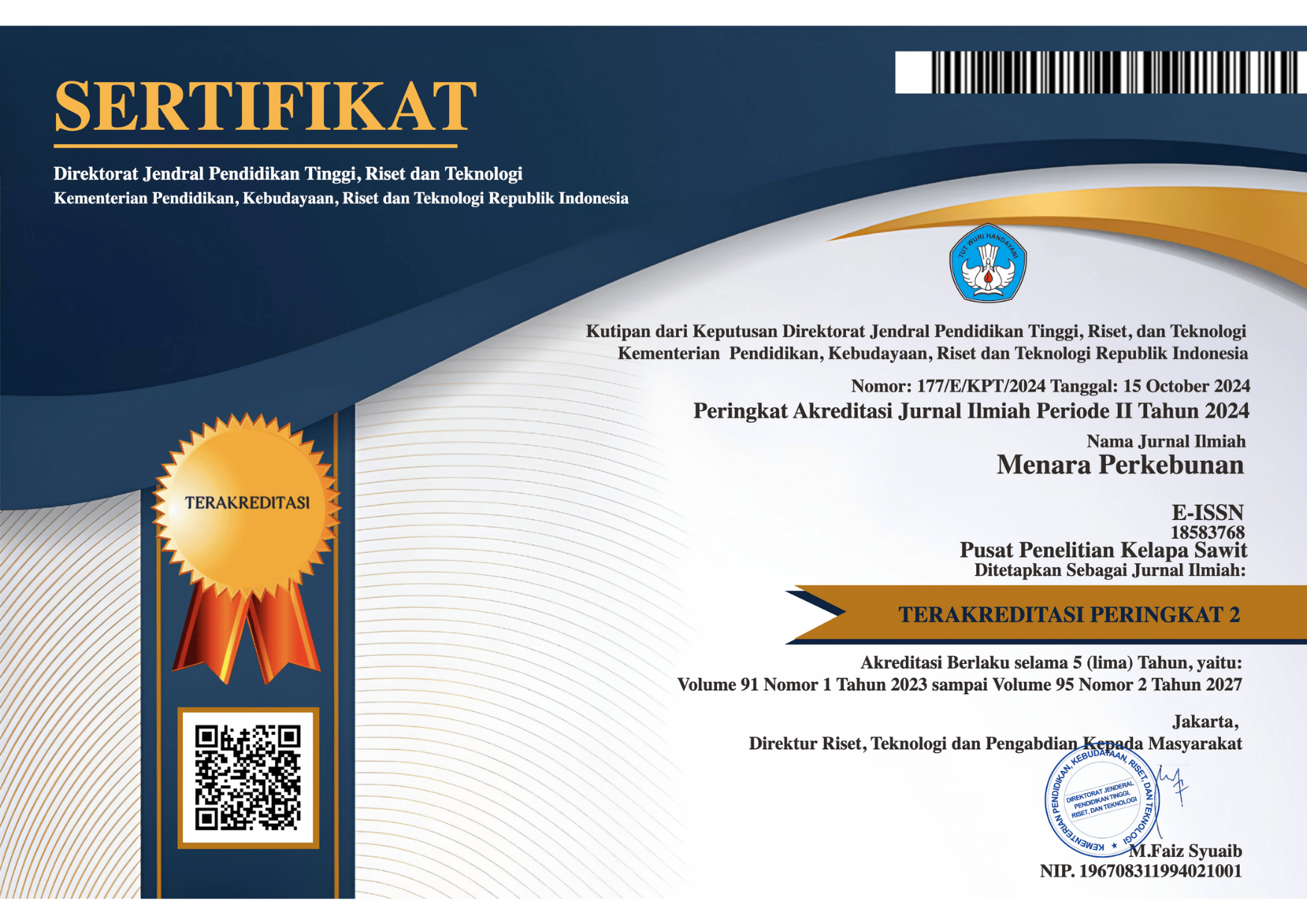Isolasi dan karakterisasi gen dehydrin dari tebu (Saccharum officinarumL.) yang terlibat dalam respon toleransi cekaman kekeringan (Isolation and characterization of dehydrin gene from sugarcane (Saccharum officinarum L.) involved in drought tolerance response)
DOI:
https://doi.org/10.22302/iribb.jur.mp.v86i2.300Keywords:
, drought stress, dehydrin, full length CDS, gene expressionAbstract
Nowadays,the development of molecular biology techniques has enabled to engineer drought tolerant sugarcane to accelerate thebreeding program. Dehydrin(DHN)that belong to the group II late embryogenesis abundant (LEA) family is known to havean important role in plant response and adaptation to abiotic stresses (drought, high salinity, cold, heat, etc.). Literature study and bioinformatics analysis reported that DHN1gene on sugarcane showed high homology sequences with sorghum DHN. The expression of DHN1gene on sugarcane var. PSJT 941 treated with various periodof drought stress had been conducted using semi-quantitative reverse transcriptase (RT)-PCR method. The results showed that the expressionlevel of DHN1 geneincreased along withthe increased period of the treatment. The highest expression level of DHN1 gene was resulted from plants that had been subjected to drought for 25 days. Amplification of DHN1gene from plants withthe highest gene expression, resulted an amplicon with a size of 465 bp which representsa full length coding sequence (CDS) of DHN1. Identification using Blast analysis showed that DHN1sequences from sugarcane var. PSJT 941 shared high homology with DHN gene on sugarcane and sorghum. The alignment results also revealed a conserved motif that characterized DHN genes.
[Key words: drought stress, dehydrin, DHN1gene, sugarcane]
Abstrak
Dengan berkembangnya teknik biologi molekuler saat ini, maka perakitan tanaman tebu yang toleran kekeringan lebih diarahkan melalui teknik rekayasa genetika untuk mempercepat program pemuliaan tanaman. Protein dehydrin (DHN) yang termasuk ke dalam kelompok II famili LEA (Late Embryogenesis Abundant)diketahui berperan penting dalam respon dan adaptasi tanaman terhadap cekaman abiotik (kekeringan, salinitas tinggi, suhu dingin, panas, dll). Studi literatur dan analisis bioinformatika menunjukkan bahwa gen DHN1pada tanaman tebu memiliki homologi yang tinggi dengan gen DHNpada sorghum. Analisis ekspresi gen DHN1pada tanaman tebu varietasPSJT 941yang diberi cekaman kekeringan telah dilakukan menggunakan semi-kuantitatifreverse transcriptase (RT)-PCR dan terlihat bahwa ekspresi gen DHN1meningkat secara nyata sejalan dengan semakin lamanya waktu pemberian cekaman. Tingkat ekspresi gen DHN1paling tinggi diperoleh dari tanaman yang mengalami cekaman kekeringan selama 25 hari. Amplifikasi gen DHN1pada tanaman dengan tingkat ekspresi yang paling tinggi menunjukkan pita dengan ukuran 465 bp yang merepresentasikan full coding sequence(CDS) gen DHN1. Identifikasi menggunakan analisis Blast menunjukkan bahwa sekuen gen DHN1dari tanaman tebu varietas PSJT 941yang diperoleh memiliki homologi yang tinggi dengan gen DHNpada tanaman tebu dan sorghum. Hasil penjajaran sekuen protein juga menunjukkan adanya motif lestari yang mencirikan gen DHN.
[Kata kunci: cekaman kekeringan, dehydrin, gen DHN1, tebu]
Downloads
Downloads
Submitted
Accepted
Published
How to Cite
Issue
Section
License
Authors retain copyright and grant the journal right of first publication with the work simultaneously licensed under a Creative Commons Attribution License that allows others to share the work with an acknowledgement of the work's authorship and initial publication in this journal.













